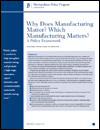Last year, President Obama asked Steve Jobs what it would take to convince him to build iPods in America, and Jobs said it couldn’t be done. And to hear the political pundits tell it, manufacturing jobs in America will soon be gone forever. But nothing could be further from the truth, according to a recent Brookings report.
American manufacturing is crucial to innovation. From 2006 to 2008, 22% of American manufacturing companies produced a new or significantly improved good or service, almost three times the proportion of non-manufacturing companies that did. While manufacturing is only 11% of our GDP, it is responsible for 68% of our R&D spending – an important part of innovation.
As U.S. manufacturing has declined, so has our historical innovation edge over other countries. Our worldwide share of science and engineering degrees, R&D spending, and patents have decreased.
Increased productivity does not explain the jobs lost in manufacturing, noting that productivity is not correlated with actual drops in manufacturing employment. The main reason for the decline is the rapid increase in information technology skills demanded in manufacturing. With the right job training, some of these job losses could be reversed.
The Brookings report outlines a three-part strategy to revive America’s manufacturing sector: make robust investments in research and development (R&D), provide better access to financing for manufacturing firms, and dramatically shift vocational training. It’s a strategy that’s proven remarkably effective in Germany, often called Europe’s “economic engine”.
The U.S. government funds basic R&D, but the manufacturing industry needs funding for applied R&D, which is tailored to specific industries and results in the development of new or modified products or processes. In Germany, well-funded R&D networks help firms, universities, public-private research centers, corporate research institutes, vocational training programs and unions work together efficiently and innovatively.
Small and medium-sized firms in Germany gain financial access by maintaining close, long-term relationships with local banks. They also benefit from public financial initiatives that help fund their networking and R&D expenses.
Finally, German workers participate in continuous vocational training, with 75% of German states guaranteeing workers five days of academic leave.
Some firms are rethinking the outsourcing of manufacturing. Last year, 61% of firms in an Accenture survey indicated they were considering shifting manufacturing closer to their customers. There are many reasons for this shift. Overseas manufacturing involves certain administrative and legal costs, risk, and complexities – like long supply chains and more delivery problems – that some firms would rather avoid. Also, Chinese wages have increased while U.S. wages have remained stagnant, significantly reducing the labor savings of outsourcing jobs to China.
We can implement these changes to modernize and strengthen our manufacturing sector, rather than watch it wither away. As the cost of overseas manufacturing rises, companies may scale back outsourcing. The U.S. should prepare for this shift so it can capitalize on new opportunities for economic growth.
Written by Pete Stewart, EOI Intern
More To Read
November 1, 2024
Accessible, affordable health care must be protected
Washington’s elected leaders can further expand essential health care
September 24, 2024
Oregon and Washington: Different Tax Codes and Very Different Ballot Fights about Taxes this November
Structural differences in Oregon and Washington’s tax codes create the backdrop for very different conversations about taxes and fairness this fall
September 10, 2024
Big Corporations Merge. Patients Pay The Bill
An old story with predictable results.


